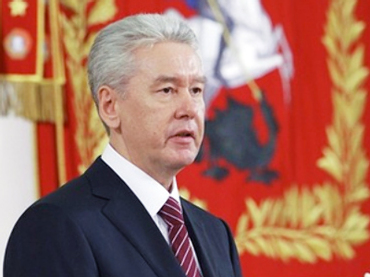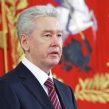
Ethnic Russians vs. North Caucasians–A Clash of Cultures?
Publication: North Caucasus Weekly Volume: 13 Issue: 19
By:

An incident in Moscow at the end of September caused tension between Russians and people of North Caucasian descent in the Russian capital. The scandal was triggered by a group of Dagestanis. Following an old tradition, members of a Dagestani wedding procession apparently started shooting in the air within Moscow’s city limits (https://newsru.com/russia/30sep2012/marryshooting.html). Moscow police asked for help from the special police forces, which blocked the wedding procession in the center of Moscow. Fifteen people from the procession ended up in a district police station, where they were fingerprinted and their licenses for nonlethal traumatic guns were verified. All of them were subsequently released in the evening of the same day (www.nashgorod.ru/news/news53658.html). Moscow Mayor Sergei Sobyanin demanded that any similar acts by the Caucasians be prevented (www.ntv.ru/novosti/344436/). To appease the anti-Caucasian wave that rose among Russians, one of the shooters, Murad Agalarov, was given administrative arrest for 15 days for alleged “petty hooliganism” and several of the drivers in the procession were fined for having tinted windshields on their cars. These limited actions by the officials, however, are unlikely to satisfy anti-Caucasian sentiments in Moscow.
Russian Prime Minister Dmitry Medvedev reacted to the incident during his visit to Dagestan on October 2, saying that such behavior was considered impermissible not only in Moscow. Medvedev said that the police in the US would have simply mowed down the wedding procession altogether (https://echo.msk.ru/news/936375-echo.html).
This is not the first such case of Russian laws being ignored in the country’s capital. On April 25, 2009, two Chechens and 17 Ingush staged a motor rally in the central part of Moscow. The rally was accompanied by the waving Chechen and Ingush flags and dancing in the busy streets of the city. The group was arrested at the Sadovoe Koltso highway and accused of exceeding the speed limit and firing weapons (https://www.uralweb.ru/news/crime/341038.html). Eventually, they were accused of disrespecting Russian laws and traditions and were fined.
Any incident involving Caucasians evokes wide discussions in Russia. Normally, all Caucasians are vilified in these angry rebukes, not just the person actually responsible for the wrongdoing. Social media is a public space where some Russians vent their anger against Caucasians (www.newsland.ru/news/detail/id/995018/). This is also commonplace on Russian TV (www.youtube.com/watch?v=AvJbt0StDqM&feature=player_embedded#!). There are though Russian radio channels that question the Russian stereotype of the “non-working Caucasian, who spends all his time at leisure” (https://finam.fm/archive-view/6703/4/). However, these attempts are evidently insufficient, especially given the Russian government’s attitude toward the problem. Earlier, a dynamic ethnic dance of Caucasians performed at the Manezhnaya Square in Moscow provided an excuse for Russian nationalists to beat up scores of Caucasians (https://fedpress.ru/news/society/news_crime/pyatero-skinkhedov-osuzhdeny-za-ubiistvo-na-manezhnoi-ploshchadi). Many Russians expressed indignation with the Caucasian dances performed on Red Square in celebration of high school graduations on July 12, although the dancers were essentially Muscovites who were born and grew up in the city (https://bigpicture.ru/?p=57857). Indeed, neither being born in Moscow nor participating in the city’s life gives the Caucasians the feeling that they are in their hometown.
The administration of Moscow’s envoy to the North Caucasus, Alexander Khloponin, has produced a guide for North Caucasian youth on how they are supposed to behave outside of their republics. This guide amounts to thinly veiled discrimination against North Caucasians (www.russkiy-rok.ru/lila/polemika1/lil-aug27.html).
In order to reduce the level of anti-Caucasus sentiment among the Russians, officials from the North Caucasus republics regularly meet with young people, who live or study in Russian cities, and call on them to abstain from publicly identifying their ethnicity (https://fed.sibnovosti.ru/society/195888-ramzan-kadyrov-vyrazil-nedovolstvo-povedeniem-chechenskoy-molodezhi).
Is this a clash of cultures in what is supposed to be a multi-ethnic and multi-religious Russia? In reality, this is not a collision or confrontation between cultures. Rather this phenomenon is better understood as assertive acts of separate individuals in Moscow, where Russian nationalists target non-Russians from the Caucasus or Central Asia by default. Moreover, this is visibly demonstrated by the Russian government’s exclusionary practices that emphasize distrust toward non-Russians. Thus, manifesting one’s identity under these conditions, when one can be persecuted by both the authorities and Russian nationalists, is an act of protest. Chechens, Ingush or Dagestanis essentially try to express their discontent or rebellion in some way. Normally, neither parents nor other relatives approve of this defiance, since they might be targeted as well. But for the young person from Chechnya or Dagestan it is important to express a protest against the system. These individuals are normally not destitute unemployed people. Rather, they are often students of prestigious Moscow universities or people who are starting their careers and witness how their ethnic kin are mistreated in Moscow on a daily basis. We are not talking about actual crimes, but rather about the traditions and customs of the North Caucasian highlanders that provoke friction between Russian nationalists and newcomers from the Caucasus region.
Defiant actions by the Caucasian diaspora in Moscow and elsewhere will intensify as Russia’s policies in the North Caucasus become tougher. Moscow itself plants the seeds of distrust toward the authorities among the non-Russian peoples. The actions of Caucasian youth in Moscow reflect their willingness to challenge the authorities and the nationalists, and this can lead to conflict.




